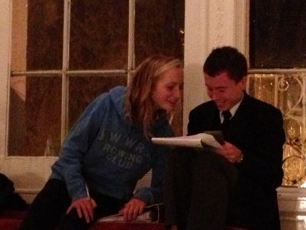Debating Science Issues (DSI) is a public speaking competition for secondary schools with a science twist. St. Columba's are once again involved this year, although our team is now comprised of TY pupils only including Arthur Moffit, Bethany Shiell, Callan Elliot, Cameron Wood, Alina Stiehler, Mark Russell and Piers Morrell. Funded by Discover Science & Engineering, DSI aims to engage young people in debate on the cultural, societal and ethical implications of advances in biomedical science. Areas like stem cell research, nanotechnology, vaccination or genetically modified foods are amongst the topics up for discussion. Earlier in the term, our team were treated to a workshop from Éilis McGrath from CRANN - Trinity College's Nanoscience Research Facility - on how to debate and research effectively. The workshop was excellent and kicked started a great run. The team, who rotate speakers from event to event, have been victorious in our first two debates, defeating St. Joesph's in Lucan and Castlecomer Community School in Kilkenny, and taking home the CRANN title. The team will face the winners from UCD CLARITY in the new year. Topics discussed so far have been nanoscience and its potential in environmental science and whether self testing was the future of health management. Our next debate will centre on ethical issues surrounding stem cell research and the team are already busy formulating their argument. Hopefully our good run will continue right through to the final.
Monday, December 10, 2012
Maths Mentoring
Mr Coldrick's latest initiative is a maths mentoring programme with TY pupils. Several TY pupils are now helping younger pupils, who struggle with maths, a number of times a week. Lydia Johnson reports.
About a month ago, Mr. Coldrick asked around the transition year, people who had done higher level in their junior cert, if they would be interested in tutoring a junior pupil in maths, as one of the numeracy initiatives. I was really enthusiastic about the idea, as I thought it would be good for the student to be taught by someone of a similar age with the same perspective, but also because it would be a great experience for us, the mentors, almost as a sort of teaching work experience. It was very appropriate for people in transition year, as this year is all about trying new things , and experiencing the type of things you wouldn`t necessarily learn in a classroom, so one on one mentoring sessions with a younger student fits perfectly into the TY programme. And so, 5 girls and 4 boys including myself in the transition year began giving lessons to our assigned students for an hour a week, in two half hour sessions or all in one go. The nine students being tutored range from first to third year, doing both higher and ordinary level junior cert, so there is a wide variety of standards. As far as I know, everybody who volunteered is thoroughly enjoying themselves, and I for one get on great with the boy I work with, and really look forward to our sessions as we do the work, but we also have great fun while we are doing it! I think it is a brilliant thing to do and I am very glad Mr. Coldrick established it, as it is very beneficial for everyone involved.
Muffin Baking
While we don't have a dedicated Home Economics room in the school, it rarely stops us from dabbling in some baking with our TY pupils. A few weeks ago, Ms. Kilfeather organised a muffin baking session - Ally Boyd Crotty tells all.
On the 14th of November, eight of us from TY went to Rice (a classroom) to make Muffins with Ms. Kilfeather. She had prepared everything perfectly to start and brought in all ingredients and products, as well as borrowing 2 of Mr. Clarke's ovens. We had the recipes for Chocolate-Chocolate-Chip Muffins and Banana-Cinnamon Muffins, but we decided on just making two lots of the Chocolate ones, as they are a favorite.
We split into two groups of four, and both groups mixed all the ingredients together in bowls, tasting as we went. When we had finished mixing, even though the consistency didn’t look so normal, we filled up the molds and stuck them in the oven. The smell filled up the classroom, and they smelled delicious.
Strangely, when we opened the oven to check if they were cooked, they didn’t look so normal… The first lot tasted quite abnormal, but also nice and sweet and they were gone in a minute. However, the second lot didn’t work out so well, they were burnt and tasted horrible. Ms. Kilfeather tried to save them by removing the burnt top and covering them in golden syrup, which did help, and soon we managed to finish them.
This was a very enjoyable night and I would love to take part in it again. Thank you so much to Ms. Kilfeather!!
Subscribe to:
Comments (Atom)



